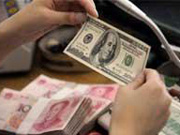Default unlikely, China to continue holding US debt

 0 Comment(s)
0 Comment(s) Print
Print E-mail CNTV, October 10, 2013
E-mail CNTV, October 10, 2013
As the ongoing US political standoff chips away at global investor confidence, there are concerns about the impact on China's investment strategy in the U.S.. Michelle Xing joins us in the studio for more.
Michelle: Thanks. Because of its low savings rate, the U.S depends on countries like China with high savings to invest their capital, to finance the US federal budget deficit. These investments help to keep the U.S interest rates relatively low and allow the U.S to consume more than it produces. China's exchange rate policy and its large current account surpluses have made it the world's largest holder of foreign exchange reserves, especially dollar denominated assets. By the end of last year, China held a total of 3.3 trillion dollars worth of foreign exchange reserves. As of July 2013, China held nearly 1.3 trillion dollars of U.S treasury bonds, accounting for more than a third of its total foreign exchange reserves. The large holdings of U.S securities have sparked concerns on the safety of these debts. Some analysts have urged the government to diversify its reserves away from U.S dollar assets, while others call for the liberalization of the exchange rate to reduce China's need to hold U.S assets. On the other hand, many say that given the current state of the global economy, China has few options for investing its foreign exchange holdings. And any major sell off of its current holdings would diminish the value of its remaining holdings.
U.S government debt is seen as a safe heaven, that's why the U.S. has been able to borrow so much, so cheaply.
But that may change overnight if it defaults. First to go, the US's triple A credit rating, which would spike up borrowing costs. Then--recession or even depression.
Given the risks at play, advisers to the central bank of China have urged authorities to diversify the holdings. China holds around 1.3 trillion U.S dollars worth of Treasury bonds.
With the U.S economy recovering, many believe that the US is capable of arranging their debt in time. But even if the current stand-off turns out to be just political theatre, investors are fast realising the risks of holding too much of one asset in one country.
Michelle: We are now well into the second week of the U.S government shutdown as Democrats and Republicans continue their stand-off over the budget. The markets, however, have been calm over the past week. Investors here in Asia believe that the chance of a default is close to zero and US bonds will maintain their value.





